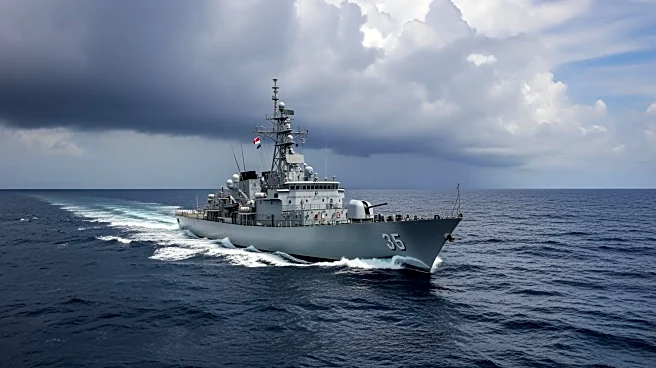What's Happening?
Russia's foreign ministry has criticized the United States for what it describes as the use of 'excessive military force' in the Caribbean Sea. This criticism comes in response to a U.S. campaign aimed
at combating illegal drug trafficking in the region. According to the Russian foreign ministry spokesperson Maria Zakharova, the U.S. actions violate both domestic legislation and international law. The U.S. has reportedly targeted at least 14 boats and resulted in the deaths of 61 people as part of this campaign. The military presence in the Caribbean has been significantly increased, with the deployment of fighter jets, warships, and thousands of troops. Russia has also reaffirmed its support for Venezuela's leadership, with President Vladimir Putin and Venezuelan President Nicolas Maduro having signed a strategic partnership agreement earlier this year.
Why It's Important?
The criticism from Russia highlights ongoing geopolitical tensions between the United States and Russia, particularly in regions where both nations have strategic interests. The U.S. military operations in the Caribbean are part of broader efforts to combat drug trafficking, which is a significant issue affecting U.S. domestic security and international relations. However, Russia's support for Venezuela and its condemnation of U.S. actions could complicate diplomatic relations and influence regional stability. The situation underscores the complex interplay of international law, national sovereignty, and military intervention, with potential implications for U.S. foreign policy and its relationships with both Russia and Latin American countries.
What's Next?
The U.S. is likely to continue its anti-drug trafficking operations in the Caribbean, given the ongoing challenges posed by illegal drug trade routes. However, the criticism from Russia may lead to increased diplomatic tensions and could prompt discussions at international forums regarding the legality and impact of such military interventions. Venezuela, with Russia's backing, may seek to leverage this situation to bolster its position against perceived U.S. interference. The international community will be watching closely to see how these dynamics unfold and whether they lead to any shifts in alliances or policy adjustments.








